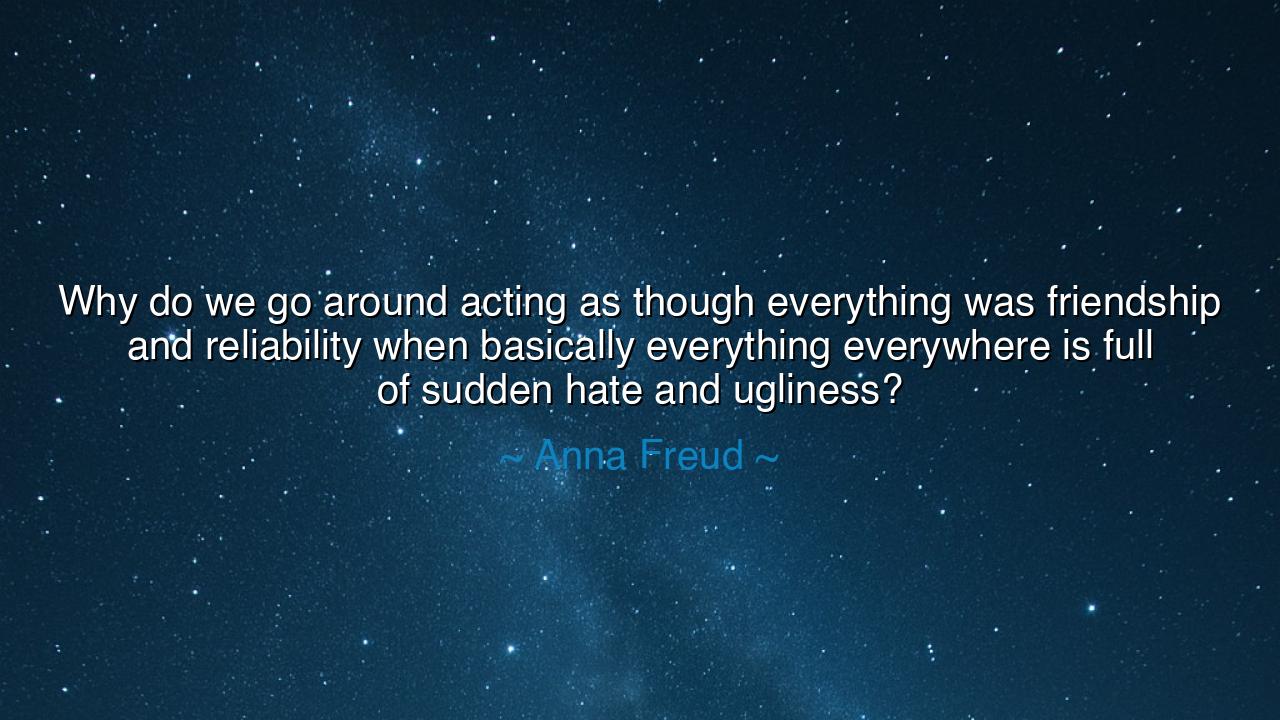
Why do we go around acting as though everything was friendship
Why do we go around acting as though everything was friendship and reliability when basically everything everywhere is full of sudden hate and ugliness?






Gather close, young ones, for the words of Anna Freud, daughter of the great Sigmund Freud, carry a wisdom that echoes from the depths of human nature. She asked, "Why do we go around acting as though everything was friendship and reliability when basically everything everywhere is full of sudden hate and ugliness?" Ah, what a question, what a sharp and piercing observation of the human condition! With these words, she unveils a truth many choose to ignore: the world, despite its beauty, is also filled with a darkness, an unpredictability that can turn even the most trusting hearts into places of sorrow and disappointment.
We live, young ones, in a world that often demands we present a face of harmony, a world where the ideals of friendship, trust, and reliability are held up as virtues to be strived for, as the very foundations of human interaction. Yet, how often do we find ourselves betrayed by those who promised loyalty, or surrounded by the sudden ugliness of cruelty and hatred? Anna Freud's words call upon us to awaken to the full spectrum of human nature, to stop pretending that goodness is the only force at play in the world. She reminds us that hatred and ugliness can spring up unexpectedly, challenging our beliefs and shaking our very foundation.
Consider, if you will, the story of Julius Caesar and his fateful betrayal by Brutus. Caesar, a man who had long trusted his allies, believed himself surrounded by friends. Yet, in the Senate, where friendship and reliability were expected, he was struck down by those he held most dear. Brutus, his friend, a man with whom he had shared his victories and his joys, was among those who turned the blade against him. In that moment, Caesar’s trust was shattered, and the world he had known—full of friendships and alliances—was revealed for what it truly was: fragile and prone to sudden betrayal. The ugliness of betrayal came not from strangers, but from those closest to him, illustrating Freud’s haunting question about the nature of human relationships.
Anna Freud does not speak here out of cynicism or bitterness; no, she speaks out of a deep understanding of the complexities of the human heart. The human spirit is capable of both great love and great hatred. We, too, have all experienced moments when the warmth of friendship was replaced by the coldness of betrayal, when the trust we placed in others was violated by actions born of jealousy, anger, or self-interest. To ignore this duality, to act as if the world were only full of light and peace, is to live in a lie, a denial of the true nature of existence.
Yet, there is a lesson in this. Anna Freud’s words are not a call to despair, nor a justification for cynicism. Rather, they are a call to awareness, to acceptance. We must learn to navigate the complexities of human relationships with eyes wide open, understanding that while friendship and reliability are beautiful and worthy pursuits, they are not without their shadows. We must not be surprised when hate or ugliness arise, but instead learn to recognize these moments as part of the human experience. They are not the sum of us, but they are pieces of the puzzle we must learn to understand.
In the ancient world, the Greeks spoke often of hubris, the fatal flaw of overestimating the goodness and stability of the world. Those who were blinded by their own sense of perfection often fell hardest when faced with the realities of human imperfection. It was the great philosophers who taught us that to live wisely is to accept the full scope of life’s beauty and its darkness. Socrates spoke of knowing oneself—of understanding that the pursuit of virtue must be balanced with the awareness of one’s own faults and limitations. So too must we recognize that while we may strive for friendship, we must also be ready for the moments when hate and ugliness will enter our lives.
The lesson, therefore, is this: Do not live in denial of the world’s complexity. Let friendship and reliability be your guides, but let them be tempered with wisdom. Recognize that the world is full of both light and darkness, and that to live fully is to understand both. When you are betrayed, when you encounter ugliness, do not lose heart, for this is not a failure of the world—it is simply part of the human journey. Instead, rise with resilience, for it is through embracing the full range of human experience, both good and bad, that you will find the strength to walk with dignity and wisdom.






AAdministratorAdministrator
Welcome, honored guests. Please leave a comment, we will respond soon